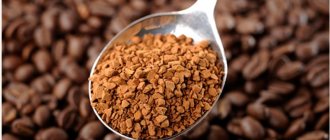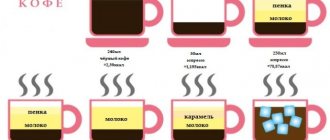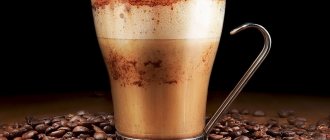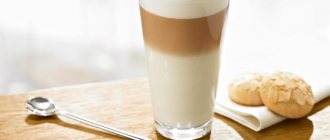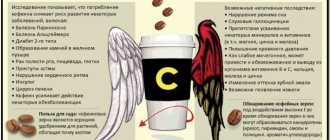Most people drink their coffee sweet. A pure black drink can taste sour (Arabica) or bitter (Robusta), or it can combine both of these shades. Sweeteners are especially often added to instant drinks in order to somehow dampen the chemical taste and make it at least a little tasty. And if coffee itself contains almost no calories, then even a spoonful of granulated sugar significantly increases the calorie content of the drink. But many of us drink not from a small cup, but from a large mug, and put two spoons, and even heaped ones. So how to calculate the calorie content of coffee with sugar, depending on various parameters?
How many calories are in coffee with sugar?
There is no definite answer to this question and there cannot be. Everything varies depending on the volume of the cup, the amount of dry matter, and especially the sweetener, as well as the method of preparation. But you can roughly calculate the number depending on how much and what kind of sugar you add, since the calorie content of the finished drink will depend entirely on the amount of sugar. At the same time, we assume that there are no more additives in the coffee.
Loose sugar
One standard size teaspoon holds:
- 5 g without slide;
- 7 g with a small slide;
- 10 g with a large slide.
When they talk about a spoonful of sugar, they usually mean a small heaped teaspoon, that is, 7 grams.
Calorie table for different types of sugar
| Type of sugar | Kcal per 100 g | kcal, per 5 g | kcal, per 7 g | kcal, per 10 g |
| Sand | 390 | 19,5 | 27,3 | 39 |
| Raw, crystals | 360 | 18 | 25,2 | 36 |
| Reed | 400 | 20 | 28 | 40 |
| Maple | 350 | 17,5 | 24,5 | 35 |
Refined sugar
Refined sugar is not standardized in any way in terms of the weight of the cubes. Depending on the shape of the abs, one cube can weigh from 3.4 to 5.95 grams.
Caloric content of refined sugar – 400 kcal per 100 grams. To calculate the exact weight of one cube, you need to open the package, count how many cubes are in one layer, multiply by the number of layers. We get the total number of cubes in the package. Divide the total weight by the quantity, we get the exact answer. Sometimes manufacturers write this data on the packaging, but this is rare.
- On average, small cubes weigh 4.5 g;
- Large cubes of “standard” size – 5.5 g.
Based on the energy value and total calorie content per 100 g of product, we find that 1 gram of refined sugar contains 4 kcal.
| Cube weight | One cube, kcal | Two cubes, kcal | 3 cubes, kcal |
| Cubes 4.5 g | 18 | 36 | 54 |
| Cubes 5.5 g | 22 | 44 | 66 |
Sugar in sticks
Usually available in standard 5 gram sticks. There are exceptions in the form of large sachets of 10 g and small sticks of 4 grams. Ordinary granulated sugar with a nutritional value of 390 kcal per 100 grams is placed there, that is:
| Packing | 1 piece, kcal | 2 pcs, kcal | 3 pcs, kcal |
| Stick 4 g | 15,6 | 31,5 | 46,8 |
| Stick 5 g | 19,5 | 39 | 58,5 |
| Stick 10 g | 39 | 78 | 117 |
Useful properties of the drink
Cocoa contains a number of biologically active substances:
- 1. Phytochemicals.
They are plant substances that have a beneficial effect on human health. - 2. Polyphenols and flavonoids.
Components with strong antioxidant effects. They can be found not only in cocoa, but also in fresh fruits, vegetables, grape skins, green tea and red wine. These antioxidants protect the body's cells from reactive oxygen species, which can cause damage to the body and cause various diseases. Athletes need these substances due to the increased formation of radicals during physical activity. - 3. Methylxanthines.
A group of alkaloids including caffeine. They have a strong stimulating effect on the central nervous system and regulate the transmission of nerve impulses. - 4. Theobromine
(about 2-10% depending on the type of bean and where it was harvested). It has a weaker stimulant effect than caffeine, but does not lead to withdrawal symptoms if its consumption is suddenly interrupted.
Cocoa has a number of beneficial properties:
- acts as a prevention of major common cardiovascular diseases;
- stimulates the nervous system, relaxes and gives a feeling of joy;
- slows down the absorption of carbohydrates into the blood;
- normalizes blood sugar levels;
- protects teeth from caries;
- helps lower blood pressure;
- promotes the formation of immunoglobulin A in saliva;
- protects cells from radicals;
- promotes normal digestion;
- acts as an antidepressant;
- is a source of energy;
- increases potency in men;
- Cocoa butter is used as a cough suppressant.
Calorie content of natural coffee with sugar
Ground natural coffee contains a minimum of calories, usually no more than 1-2 per 100 grams. Arabica has a little more, since this type of bean initially contains more fats and natural sugars; Robusta has a little less, but this is not significant. We previously wrote in detail about the calorie content of coffee without sugar.
A 200-220 ml cup provides 2-4 calories. Let's calculate the energy value if you put 1 or 2 tablespoons of sand in a cup, with or without a slide. If you use sticks or refined sugar, focus on the indicators of 1 or 2 level spoons (5 grams).
Calorie table for coffee with sugar
| Type of drink | Volume, ml | Coffee calories per serving | With 1 spoon of sugar 5 g | With 2 spoons of sugar 10 g | With 1 spoon of sugar 7 g | With 2 spoons of sugar 14 g |
| Ristretto | 15 | 1 | 21 | |||
| Espresso | 30 | 2 | 22 | 41 | 29 | |
| Americano | 180 | 2,2 | 22 | 41 | 30 | 57 |
| Double Americano | 240 | 4,4 | 24 | 43 | 32 | 59 |
| Filter or French press coffee | 220 | 2 | 22 | 41 | 29 | 57 |
| Infused in cold water | 240 | 6 | 26 | 45 | 33 | 61 |
| In Turk, cooked | 200 | 4 | 24 | 43 | 31 | 59 |
Milk and coffee, how they interact
Milk and dark coffee mix well together. Moreover, milk even improves the beneficial properties of coffee. As mentioned above, it softens the effect of caffeine, which means that coffee with milk can be drunk in small quantities by those people for whom caffeine is harmful: children, pregnant women, the elderly, people prone to insomnia. Also, coffee with milk is not so addictive, because the effect of caffeine in it is weaker.
Coffee with added milk is not as great a pick-me-up during the day. In addition, hot milk itself has a sleeping effect. For those who want to wake up quickly, it is better to drink regular dark coffee, and after lunch you can treat yourself to a drink with added milk.
There is no point in drinking coffee with milk to raise your blood pressure. Milk prevents caffeine from constricting blood vessels. If the drink helps, it will be for a short time. If your blood pressure is low, it is still better to drink a cup of dark coffee.
Coffee owes its bitter taste to tannins. Milk binds these substances, so the bitterness becomes less, and the drink acquires a gentle taste.
Calorie content of instant coffee with sugar
The nutritional value of instant coffee drink is higher than that of natural coffee. This is due to the fact that during the manufacturing process 15-25% of natural grains remains, the rest are stabilizers, emulsifiers, dyes and other chemical components. It happens that even crushed flour or chicory is added. Therefore, a teaspoon of instant powder or granules contains many more calories.
Different manufacturers have different components of the finished product, and the energy value of pure soluble powder (or granules) can range from 45 to 220 kcal per 100 grams. One cup of instant coffee is usually placed with a large heap or 2 almost without a heap (10 g in total). Let's calculate the total nutritional value of a 200 ml drink made from coffee of different calorie content and different amounts of sand.
200 ml is the standard volume of an average plastic cup or medium-sized cup.
If you do not know the exact calorie content of coffee, calculate at the rate of 100 kcal per 100 g, this is the mass average. The energy value of granulated sugar is calculated as 3.9 kcal in 1 gram. The exact numbers for a specific brand and a specific product can be found on the packaging; we will focus on the 3 most popular values.
Calorie table for instant coffee without sugar, with 1 spoon, with 2 spoons
| Kcal in coffee per 100 grams | Kcal in coffee per 200 ml serving | With 1 spoon of sugar 5 g | With 2 spoons of sugar 10 g | With 1 spoon of sugar 7 g | With 2 spoons of sugar 14 g |
| 50 | 5 | 25 | 44 | 32 | 60 |
| 100 | 10 | 30 | 49 | 37 | 65 |
| 220 | 20 | 40 | 59 | 47 | 75 |
Using cocoa for weight loss
It’s hard to imagine, but many people also use cocoa for weight loss.
After a cup of hot drink, a long-lasting feeling of satiety really appears (up to 4 hours). However, for those who want to lose weight, it will be interesting to familiarize yourself with the following data of the drink: fats - 47% of calories, proteins - 34% of calories, carbohydrates - 14%. The most surprising thing is that the majority of diets use an appetite suppression system, which acts through a kind of deception of its body.
However, those who use cocoa for weight loss benefit greatly, since during such a diet blood circulation improves and water and hormonal metabolism are stabilized. Therefore, a person feels more cheerful. Plus, due to the human body’s need for calories, it has to spend its existing reserves of fat. This helps transform and balance the body's fat cells.
Cocoa is a favorite treat for both children and adults. This aromatic treat is familiar from childhood. Cocoa powder is made from the seeds of the chocolate tree. They are fried, cleaned, and then crushed, the oil is squeezed out and ground into powder. The calorie content of cocoa in its pure form is low. But rarely do we drink it without any additives.
This drink has been popular for a long time. Its homeland is considered to be South America, which has optimal climatic conditions for the growth of the cocoa tree. Once in other countries of the world, cocoa became a favorite hot drink. Initially, it was a bitter, thick mixture, but the recipe was improved over many years, and now a sweet drink with a liquid consistency is a classic. But still, additional products can be added to it, such as cinnamon or even chili pepper.
Cocoa contains tonics, antidepressants and antioxidants. The drink is very useful: it helps normalize blood circulation, improve brain function, and cope with depression. The treat stimulates the production of the “happiness hormone” – endorphin. Many scientists believe that a cup of this delicious drink will invigorate you just as much as coffee, but will not harm the body at all.
The fruits of the chocolate tree contain the following vitamins: A, E, PP, group B, beta-carotene. In addition, this product is rich in the following beneficial substances: calcium, magnesium, iron.
Despite the benefits of this product, it also has contraindications:
- age up to 3 years;
- diseases of the nervous system;
- diabetes mellitus;
- sclerosis and others.
Calories in decaffeinated coffee with sugar
Natural decaffeinated black coffee contains no more than 1 calorie per cup, instant coffee can have calories and about 15 kcal per cup of drink made from 10 grams of powder or granules (1 heaped teaspoon or 2 almost level). So if you drink a natural decaffeinated drink, you can simply add 1 calorie to the calories from the sweetener, regardless of cup size, and if you drink an instant drink, on average, you can add 10 kcal. The exact information can be found on the packaging.
Despite the fact that the natural decaf drink has almost no energy value, it is not recommended to consume it in quantities of more than 6 servings per day.
For those who need it faster
It is worth mentioning another coffee-containing product that is enjoying some popularity - a bag of three-in-one coffee drink. 20 grams (standard bag weight) gives about 70 kilocalories, and the thing is that most of the mixture is sugar. So people watching their weight should not get carried away with this. It will be better and healthier to drink natural coffee.
From all of the above, it follows that coffee itself does not affect the consumer’s weight in any way, and if you drink it without sugar and other additives, you don’t have to burden yourself with counting calories. Additives are not prohibited, but you should carefully monitor their quantity, as well as the number of servings of coffee consumed per day.
What do nutritionists say about coffee? About this in our video:
A one-time consumption of coffee drinks based on full-fat milk, cream or chocolate in a cafe will not cause much harm, but you should not overdo it, otherwise you will quickly see the result of such liberties. Consume coffee and supplements in moderation and you can enjoy its taste without any worries.
Conclusions:
- Basically, the calorie content of the drink depends on the amount of granulated sugar added - 390 kcal per 100 grams of sand, 400 for refined sugar.
- For maximum convenience of counting, you can take a heaped teaspoon of granulated sugar for 30 kcal.
- Instant coffee itself has more calories than natural coffee, and a drink in a standard 200 ml glass with two sticks / refined sugar cubes / level spoons of sugar is 50 kcal.
- In an average portion of natural coffee ~200 ml and with two sticks / cubes of refined sugar / level spoons of sugar - 40-43 kcal.

